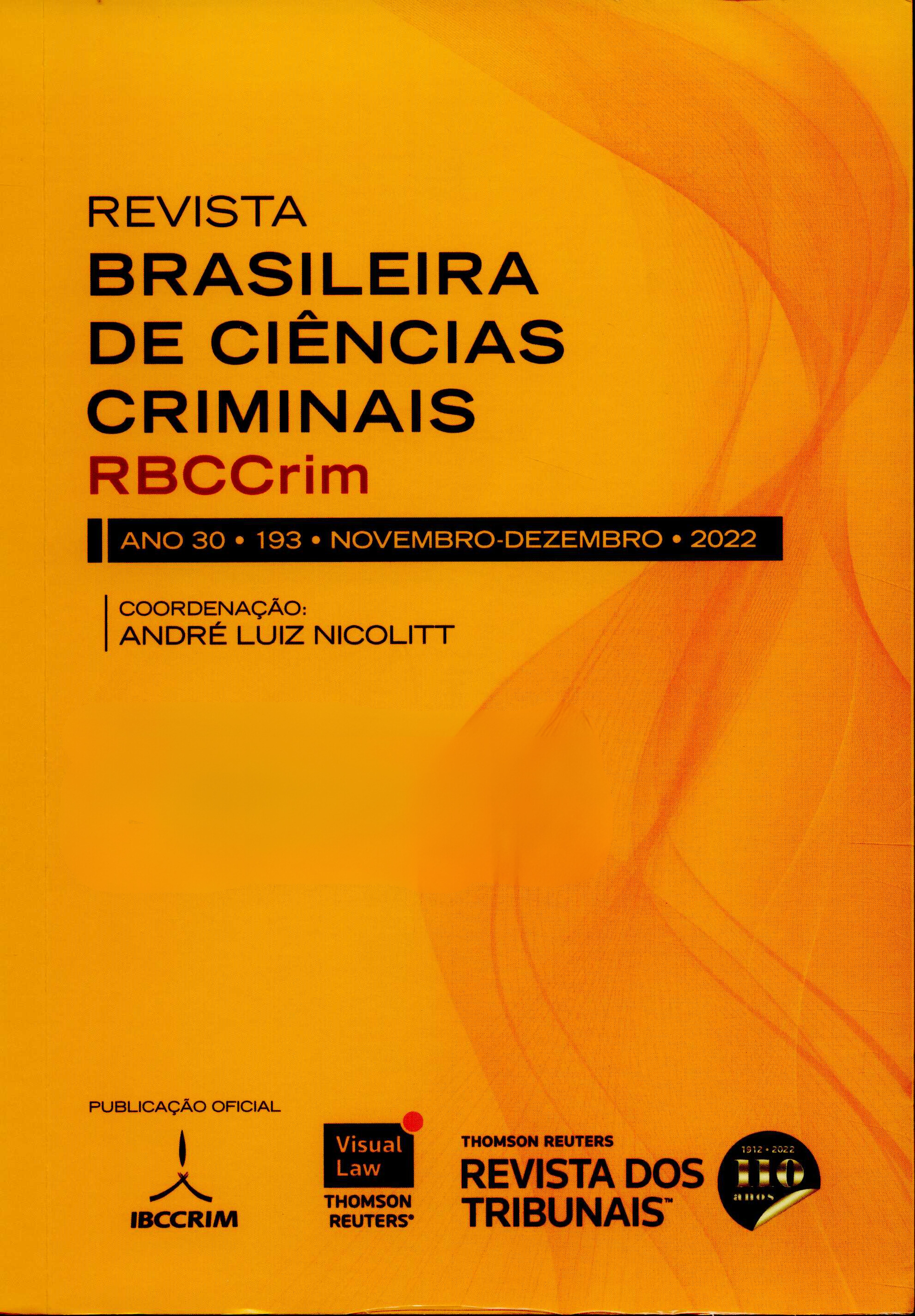La corrupción pública en la política criminal de la Unión Europea:
breves consideraciones
Visualizações: 196DOI:
https://doi.org/10.5281/zenodo.11094691Palavras-chave:
Corrupción pública, competencia legislativa penal europea, propuesta de directiva de combate a la corrupciónResumo
El presente estudio tiene por finalidad realizar un análisis crítico sobre el proceso de formación, desarrollo y consolidación de la actual política criminal de prevención y represión de la corrupción pública en el ámbito de la UE. Para cumplir con ese desiderátum, el artículo se estructura en dos principales apartados. En un primer momento se abordará la evolución del discurso anticorrupción europeo a lo largo de las diferentes etapas del proceso constitutivo de la UE, discurso éste que se va desarrollando de forma paulatina y, en cierta medida, de modo paralelo a la progresiva adquisición por la UE de una competencia legislativa en materia penal. Superada esa etapa, examinaré los aspectos más relevantes de la propuesta de directiva sobre la lucha contra la corrupción, cuyo objetivo declarado es actualizar el marco normativo de la UE y, en particular, incorporar en un único acto jurídico las medidas de prevención y represión del fenómeno previstas en anteriores instrumentos normativos internacionales, destacándose entre ellos la Convención de las Naciones Unidas contra la corrupción de 2003.
Downloads
Publication Facts
Reviewer profiles Indisp.
Author statements
Indexed in
- Academic society
- Instituto Brasileiro de Ciências Criminais
- Publisher
- Editora Revista dos Tribunais (RT)
Referências
AMBOS, K. European criminal law. Cambridge: Cambridge University Press, 2018.
ARGADOÑA, A. The United Nations convention against corruption and its impact on international companies. Journal of Business Ethics, v. 74 (4), pp. 481-496, 2007.
ASP, A. The importance of the principles of subsidiarity and coherence in the development of EU criminal law. EuCLR, v. 01(01), pp. 44-56, 2011
ASP, P. The substantive criminal law competence of the EU. Stockholm: Skrifter utgivna av juridiska fakulteten vid Stockholms universitet, n. 79, 2012.
BERGUGO GÓMEZ DE LA TORRE, I. La respuesta penal internacional frente a la corrupción. Consecuencias sobre la legislación española. Estudios de Deusto, v. 63 (1), pp. 229-265, 2015.
BRODOWSKI, D. El poder de acusar en nombre de Europa: la Fiscalía Europea como hito de la política penal supranacional. REDE, n. 83, 2022, pp. 57-73, 2022.
BUSCH, M. Negotiation and transposition of the PIF directive: the German perspective. EUCRIM, n. 03, pp. 182-187, 2021.
CAPDEFERRO VILLAGRASA, O. La obligación jurídica internacional de luchar contra la corrupción y su cumplimiento por el Estado español. Eunomía, Revista en Cultura de la Legalidad, n. 13, pp. 114-147, 2017-2018.
CARDENAL MONTRAVETA, S., ROGÉ SUCG, G. III. Cohecho. En: CORCOY BIDASOLO, M. Manual de derecho penal. Parte especial. 3 ed. Valencia, Tirant lo Blanch, 2023.
CARR, I. Fighting corruption through regional and international conventions: a satisfactory solution? European Journal of Crime, Criminal Law and Criminal Justice, v. 15 (2), pp.121-153, 2007.
CLEMENTUCCI, F., MIEKINA, A. The commission proposal for a directive on combating corruption. EUCRIM, n. 03, pp. 276-279, 2023.
CORRAL MARAVER, N. Racionalidad legislativa y elaboración del derecho penal en la Unión Europea. Valencia: Tirant lo Blanch, 2020.
CORSTENS, G. J. M. Criminal law in the first pillar? European Journal of Crime, Criminal Law & Criminal Justice, v. 11 (1), pp. 131-144, 2003.
DE HERT, P., WIECZOREK, I. Testing the principle of subsidiarity in EU criminal policy: the omitted exercise in the recent EU documents on principles for substantive European criminal law. New Journal of European Criminal Law, v. 3, (3-4), pp. 394-411, 2012
DE LA CUESTA ARZAMENDI, J. L. Iniciativas internacionales contra la corrupción. EGUZKILORE, n. 17, pp. 05-26, 2003.
DELLA PORTA, D. VANNUCCI, A. The governance mechanisms of corrupt transactions. En: LAMBSDORFF, J. G., et. al. The new institutional economics of corruption. London, New York: Routledge, 2005, p. 154-155.
DELLA PORTA, D., VANNUCCI, A. The hidden order of corruption: an institutional approach. Surrey, England (Ashgate), 2012 (e-book).
DI FRANCESCO MAESA, C. Directive (EU) 2017/1371 on the fight against fraud to the Union’s financial interests by means of criminal law: a missed goal? European Papers, v. 3 (3), pp. 1455-1469, 2018.
DÍEZ RIPOLLÉS, J. L. La racionalidad de las leyes penales: práctica y teoría. 2. ed. ampl. Madrid: Editorial Trotta, 2013.
DÖLLING, D. Grundlagen der Korruptionsprävention. En: DÖLLING, D. Handbuch der Korruptionsprävention für Wirtschaftsunternehmen und öffentliche Verwaltung. München (Verlag C. H. Beck), 2007.
ERBEŽNIK, A. European public prosecutor's office (EPPO) –too much, too soon, and without legitimacy? EuCLR, v. 05(2), pp. 209-221, 2015
ESQUINAS VALVERDE, P. Delitos contra la Administración Pública. En. MARÍN DE ESPINOSA CEBALLOS, E. (dir.) Lecciones de derecho penal. Parte especial. 3. ed. Valencia: Tirant lo Blanco, 2022.
FEROLA, L. The fight against organized crime in Europe building an area of freedom, security and justice in the E.U. International Journal of Legal Information, v. 30 (1), pp. 53–91, 2002.
FRANSSEN, V. EU criminal law and effet utile: a critical examination of the union’s use of criminal law to achieve effective enforcement. En: BEATA BANACH-GUTIERREZ, J., HARIDNG, C. EU Criminal law and policy: values, principles and methods. New York: Routledge, 2017.
FROMM, I. E. ‘Ius puniendi’: the right of the institutions of the EC to protect the financial interests of the EC from fraud (art. 280 paragraph 4 EC Treaty)? European Journal of Crime, Criminal Law and Criminal Justice, v. 16, pp. 125-142, 2008.
GAGLIO, I, et al. Strengthening the fight against corruption: assessing the EU legislative and policy framework. European Union, 2023.
GARCIADANDÍA GARMENDIA, R. La aplicación de las nomas de derechos internacional contra la corrupción. Anuario Español de Derecho Internacional, vol. XXIV, pp. 241-269, 2008.
GÓMEZ-JARA DÍEZ, C., HERLIN-KARNELL, E. Prosecuting EU financial crimes: the European public prosecutor's office in comparison to the US federal regime. German Law Journal, v. 19 (5), pp. 1191-1220, 2018.
GRASSO, G. El futuro de la armonización del derecho penal en la ampliación de la Unión Europea. En: ZUGALDÍA ESPINAR, J. M.; LÓPEZ BARJA DE QUIROGA, J. Dogmática y ley penal: libro homenaje a Enrique Bacigalupo. Derecho Penal. Parte general (v. I). Madrid: Marcial Pons, 2004.
HECKER, B. Europäisches Strafrecht post-Lissabon. En: AMBOS, K. (org.) Europäisches Strafrecht post-Lissabon. Göttingen: Universitätsverlag Göttingen, 2011.
JIMÉNEZ-DÍAZ, M. J. La lucha internacional contra la corrupción. Un frente abierto. Cuadernos de Política Criminal, v. 135 (III), Época II, pp. 05-47, 2021.
KAIAFA-GBANDI, M. The post-Lisbon approach towards the main features of substantive criminal law: developments and challenges. European Criminal Law Review, n. 5 (1), pp. 03-18, 2015.
KAIAFA-GBANDI, M. The protection of the EU’s financial interests by means of criminal law in the context of the Lisbon Treaty and the 2017 Directive (EU 2017/1371) on the fight against fraud to the Union’s financial interests. ZIS, n. 12, pp. 575- 582, 2018.
MIETTINEN, S. Criminal law and policy in the European Union. London, New York: Routledge, 2013.
MIETTINEN, S. Implied ancillary criminal law competence after Lisbon. EuCLR, v. 3 (2), 2013.
MITSILEGAS, W. EU criminal law. Oxford and Portland, Oregon: Hart Publishing, 2009, p.108.
MONGILLO, V. Strengths and weaknesses of the proposal for a EU directive on combating corruption. Sistema Penale, n. 07, pp. 01-21, 2023.
MUÑOZ DE MORALES ROMERO, M. Derecho penal europeo. Valencia: Tirant lo Blanch, 2020.
NIETO MARTÍN, A. El derecho penal económico y de la empresa europeo e internacional. En: DE LA MATA BARRANCO, et al. Derecho penal económico y de la empresa. Madrid: Dykinson, 2018.
NIETO MARTIN, A. Posibilidades y límites de la armonización del derecho penal tras Comisión v. Consejo (comentario a la STJCR, asunto C-176/03 de 13-09-2005). En: ARROYO ZAPATERO; NIETO MARTIN (dirs.). El derecho penal de la Unión Europea: situación actual y perspectivas de futuro. Cuenca: Ediciones UCLM, 2007.
PEERS, S. EU justice and home affairs law. 2. ed. Oxford: Oxford University Press, 2006
PÉREZ BERNABEU, B. La protección de los intereses financieros comunitarios. Alicante: Publicacions de la Universitat d'Alacant, 2006.
RODRÍGUEZ-MEDEL NIETO, C. En el corazón de la Fiscalía Europea: las salas permanentes. Revista de Estudios Europeos, n. extra 1, pp. 01-27, 2023.
ROSE-ACKERMAN, S., PALIFKA, B. J. Corruption and government: causes, consequences, and reform. 2. ed. New York: Cambridge University Press, 2016 (e-book).
ROSIN, K., KÄRNER, M. The limitations of the harmonisation of criminal law in the European Union protected by articles 82(3) and 83(3) TFEU. European Journal of Crime, Criminal Law and Criminal Justice, v. 26 (4), pp. 315-334, 2018.
ROSSETTO, P. C. El bien jurídico tutelado en los supuestos delictivos de la corrupción política: breves consideraciones. En: MUÑOZ SÁNCHEZ et al. Diálogos sobre cuestiones problemáticas de las ciencias penales. Valencia: Tirant lo Blanch, 2023.
ROSSETTO, P. C. La delimitación del concepto corrupción: el comportamiento corrupto en el ámbito político. Revista General de Derecho Penal, n. 40, 2023.
RUBIO LARA, P. A. El derecho penal europeo en la legislación española. Valencia: Tirant lo Blanch, 2020.
SATZGER, H. Auf dem Weg zu einem Europäischen Strafrecht: Kritische Anmerkungen zu dem Kommissionsvorschlag für eine Richtlinie über den strafrechtlichen Schutz der finanziellen Interessen der Gemeinschaft. Zeitschrift für Rechtspolitik, v. 34 (12), pp. 549-554, 2001.
SATZGER, H. Bestechungsdelikte und Sponsoring. ZStW, v. 115 (3), pp. 469-500, 2003.
SATZGER, H. Internationales und Europäisches Strafrecht. 10. ed. Baden-Baden: Nomos, 2022.
SICURELLA, R. EU competence in criminal matters. En: MITSILEGAS, V. et. al. Research handbook on EU criminal law. Cheltenham, UK, Northampton, MA, USA: Edward Elgar Publishing, 2016.
SIMON, P. The criminalisation power of the European Union after Lisbon and the principle of democratic legitimacy. New Journal of European Criminal Law, v. 03 (3-4), pp. 242-256, 2012.
SZAREK-MASON, P. The European Union’s fight against corruption: the evolving policy towards Member States and candidate countries. Cambridge: Cambridge University Press, 2010.
TASEVA, E. The new European Commission anti-corruption package: towards a more efficient fight against corruption? New Journal of European Criminal Law, v. 3(3–4), 344–362, 2012.
VALEIJE ÁLVAREZ, I. Visión general sobre las resoluciones e iniciativas internacionales en materia de corrupción. Anuario da Facultade de Dereito da Universidade da Coruña, n. 7, pp. 777-814, 2003.
VAN GERVEN, W. Constitutional Conditions for a Public Prosecutor's Office at the European Level. European Journal of Crime, Criminal Law and Criminal Justice, v. 8 (3), pp. 296-318, 2000.
VAN GERVEN, W. Constitutional conditions for a public prosecutor's office at the European level. European Journal of Crime, Criminal Law and Criminal Justice, v. 8 (3), pp. 296-318, 2000.
VERVAELE, J. A. E. Harmonised Union policies and the harmonisation of substantive criminal law. En: GALLI, F., WEYEMBERG, A. (eds.). Approximation of substantive criminal law in the EU: the way forward. Bruxelles: Editions de l’Université de Bruxelles, 2013.
VOGEL, J. Die Strafgesetzgebungskompetenzen der Europäischen Union nach Art. 83, 86 und 325 AEUV. En: AMBOS, K. (org.) Europäisches Strafrecht post-Lissabon. Göttingen: Universitätsverlag Göttingen, 2011.
WASMEIER, M.; THWAITES, N. The «battle of the pillars»: does the European Community have the power to approximate national criminal law? European Law Review, v. 29 (5), pp. 613-635, 2004.
WEBB, P. The United Nations convention against corruption: global achievement or missed opportunity? Journal of International Economic Law, v. 8 (1), pp. 191–229, 2005.
WEYEMBERGH, A. Introduction: Approximation of substantive criminal law: the new institutional and decision-making framework and new types of interaction between EU actors. En: GALLI, F., WEYEMBERG, A. (eds.). Approximation of substantive criminal law in the EU: the way forward. Bruxelles: Editions de l’Université de Bruxelles, 2013.
ZIMMERMAN, F. Hauptsache strafbar? Eine Bewertung des Kommissionsvorschlags für eine EU-Richtlinie zur Bekämpfung der Korruption (COM [2023] 234 final). ZfIStW, v. 03, pp. 383-395, 2023.
ZOUMPOULAKIS, K. From the ground up: the use of minimum rules in EU procedural criminal law and the question of member states’ discretion. European Papers, v. 5 (3), pp. 1289-1303, 2020.
ZOUMPOULAKIS, K. The unresolved tension between the approximation of criminal norms in the EU and the question of national discretion: what is the role of minimum rules in EU criminal law? Boom Strafblad, v. 3(6), pp. 315-318, 2022.
Downloads
Publicado
Como Citar
Edição
Seção
Licença
Os direitos autorais dos artigos publicados são do autor, com direitos do periódico sobre a primeira publicação.
Os autores somente poderão utilizar os mesmos resultados em outras publicações indicando claramente este periódico como o meio da publicação original. Se não houver tal indicação, considerar-se-á situação de autoplágio.
Portanto, a reprodução, total ou parcial, dos artigos aqui publicados fica sujeita à expressa menção da procedência de sua publicação neste periódico, citando-se o volume e o número dessa publicação. Para efeitos legais, deve ser consignada a fonte de publicação original.



 Português (Brasil)
Português (Brasil)
 English
English
 Español (España)
Español (España)












 Assine a Revista:
Assine a Revista: 

